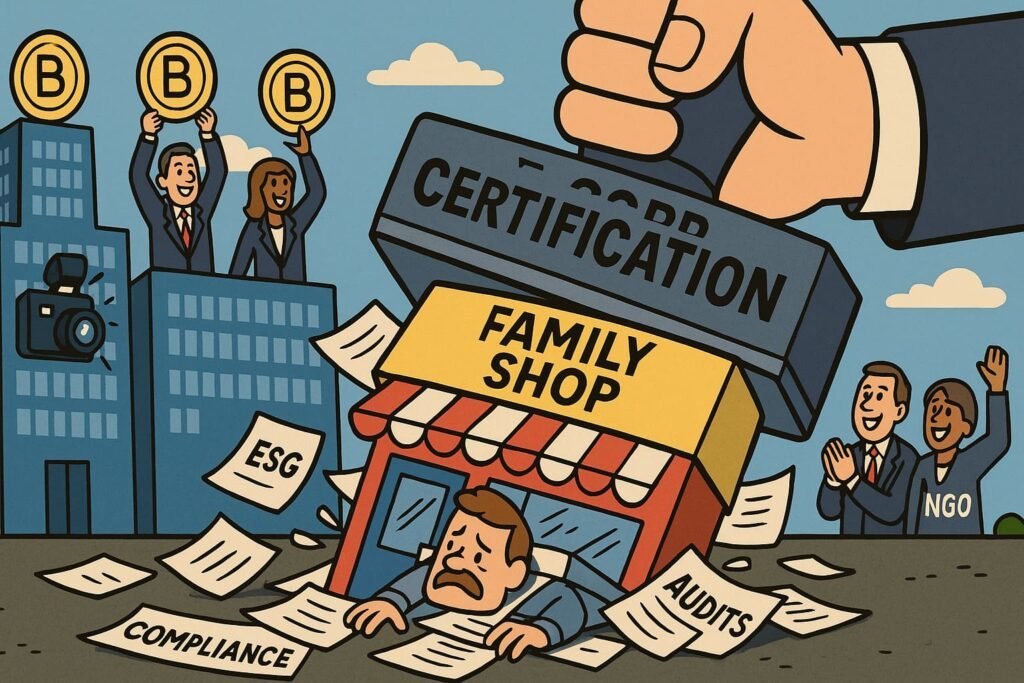B Corp Certification – Corporate Trap for Small Business
From Badge of Virtue to Bureaucratic Cage
B Corp Certification is sold as the gold standard for “responsible” business. For small firms, it looks like credibility in a logo. In reality, it’s a pipeline into ESG-style compliance — costly, bureaucratic, and stacked in favour of corporate giants.
Table of contents
What Is B Corp Certification?
On paper, it’s about proving your business meets high standards of “social and environmental responsibility.”
- Submitting to audits.
- Meeting benchmarks on diversity, sustainability, and governance.
- Paying certification fees.
- Legally changing company structure to prioritise “purpose” alongside profit.
It sounds noble. In practice, it embeds businesses into ESG — the same framework driving woke corporatism.
Buzzwords of B Corp
Like all woke frameworks, it comes with its own moral jargon:
- Purpose over profit – sounds ethical, but vague.
- Stakeholder governance – dilutes ownership and control.
- Sustainability metrics – flexible numbers, easy for corporations to game.
- Social impact – a catch-all for diversity pledges and equity targets.
These words sell virtue while masking red tape.
Why Small Businesses Fall Into the Trap
Family firms and start-ups are lured by three temptations:
- Branding appeal: the logo looks virtuous to customers.
- Market access: some contracts prefer certified suppliers.
- Moral pressure: in a woke business climate, not joining looks suspicious.
But once inside, they face audits, consultant fees, and endless reporting — costs they can’t absorb.
Why Big Corporations Love B Corp
For corporate giants, B Corp is perfect:
- They can afford compliance teams.
- They use the badge as PR, while offshoring exploitation.
- They get cheap “ethics branding” compared to raising wages or paying taxes.
The badge doesn’t level the playing field — it tilts it further.
From Voluntary to Trojan Horse
Step 1: NGOs and activists frame B Corp as the standard.
Step 2: Corporations adopt it to polish their brand.
Step 3: Governments embed it in regulation.
What began as “voluntary” becomes de facto mandatory. Small firms get trapped in rules they never chose.
The Consequences for Small Firms
- Financial strain: fees, consultants, lost hours.
- Bureaucracy: audits and ESG paperwork designed for giants, not family shops.
- Loss of freedom: legal commitments to vague ideals of “purpose.”
- Competitive disadvantage: corporations benefit, small businesses drown.
Why It Matters
B Corp isn’t about helping small businesses. It’s about expanding ESG into every corner of the economy. Corporations, consultants, and bureaucrats profit. Small businesses lose independence.
It’s not reform — it’s control, wrapped in a badge of virtue.
🔗 For more on how ESG shapes corporate power, see our explainer: ESG – The Business of Virtue.
🔗 To understand how woke branding works at scale, read: Woke Capitalism Explained.
🔗 For the bigger picture of how corporations gained their power, visit The Power of Business & Corporations Explainer Hub.
👉 Want the full story on how virtue became a business model? Visit our ESG Explainer Hub to see how finance, branding, and compliance turned morality into a market.
FAQ:
What is B Corp Certification?
A certification claiming to prove social and environmental responsibility, embedding firms into ESG-style compliance.
Why is B Corp a problem for small businesses?
Because it adds high costs and bureaucracy only corporations can absorb.
Who benefits from B Corp?
Corporations, consultants, NGOs, and regulators — not the small firms who pay the price.
Is B Corp voluntary?
Yes, but as adoption spreads, it risks becoming a de facto requirement.
What’s the danger?
Small firms lose time, money, and independence while big players exploit the badge as cheap PR.



